Recommended reading

To be a disciple means to be a learner. Disciples of Jesus are called to be 'life-long learners', always growing in their faith and knowledge of God's Word. In our modern culture where there are so many competing forms of spirituality it is even more important that Christians know what they believe and why they believe it. Below in no particular order are some books that our pastor recommends for people who want to explore different areas of the Christian faith and grow in their understanding. Some of these books are available through Australian Church Resources. If it's not available there try The Book Depository who have free shipping all over the world.
The Lutheran Study Bible
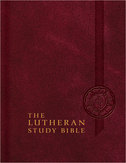
This Bible is perfect for those who want to take their personal study of the Scriptures to a deeper level. It has helpful notes, prayers, cross references, diagrams, articles, maps and even glossy colourful pictures! The notes were contributed by Lutheran theologians from all over the world. The Bible is not only study-oriented but also devotional. Luther's catechism is included.
Concordia: The Lutheran Confessions
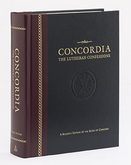
The Book of Concord is the authoritative collection of the Lutheran Church’s statements of faith. It contains documents which Lutheran Christians have used since the sixteenth century to explain, defend, and advance their witness to the truth of God’s Word. Nothing is more important than clearly confessing and bearing witness to the truths of God's Holy Word which reveal the glorious Gospel of our Lord and Savior Jesus Christ. This is what the Book of Concord is all about. This edition of the Lutheran Confessions will instruct, inspire and educate all who use it and help them learn what it means to be, and to remain, a genuinely confessing Lutheran Christian.
Mere Christianity, C.S. Lewis
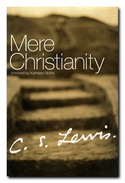
This is a Christian classic. In it C.S. Lewis lays out his case for 'mere' Christianity which he defines as 'the beliefs and practices which have been common to nearly all Christians of all times'. With his focused writing style and brilliant illustrations Lewis does in a short book what most authors attempt to do in volumes. A great book for those who have intellectual challenges and objections to Christianity.
The case for Christ, Lee Strobel
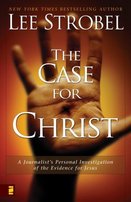
A seasoned journalist chases down the biggest story in history. The Project: Determine if there’s credible evidence that Jesus of Nazareth really is the Son of God. The Reporter: Lee Strobel, educated at Yale Law School, award-winning former legal editor of the Chicago Tribune—with a background of atheism. The Experts: A dozen scholars, with doctorates from Cambridge, Princeton, Brandeis, and other top-flight institutions, who are recognized authorities on Jesus. The Story: Retracing his own spiritual journey, Strobel cross-examines the experts with tough, point-blank questions: How reliable is the New Testament? Does evidence exist for Jesus outside the Bible? Is there any reason to believe the resurrection was an actual historical event?
Lutheranism 101
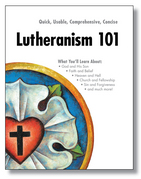
Lutheranism 101 examines Lutheran beliefs and heritage in a fresh way. If you are a lifelong Lutheran searching for more information or new to Lutheranism looking to understand what we believe, this book will be your guide. It is written in an easy-to-read conversational style with short articles, side-bar features, and some humor. Lutheranism 101 helps create a solid foundation of reference upon which a lifetime of sound teaching can be built. Explore the basics of Lutheran theology by digging into the history of Lutheranism and making connections between what Lutherans believe and what Lutherans do.
The great divorce, C.S. Lewis
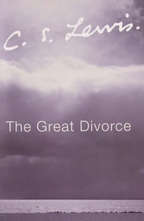
What if anyone in Hell could take a bus trip to Heaven and stay there forever if they wanted to?
In The Great Divorce C. S. Lewis again employs his formidable talent for fable and allegory. The writer finds himself in Hell boarding a bus bound for Heaven. The amazing opportunity is that anyone who wants to stay in Heaven, can. This is the starting point for an extraordinary meditation upon good and evil, grace and judgment. Lewis's revolutionary idea is the discovery that the gates of Hell are locked from the inside. In Lewis's own words, "If we insist on keeping Hell (or even earth) we shall not see Heaven: if we accept Heaven we shall not be able to retain even the smallest and most intimate souvenirs of Hell."
In The Great Divorce C. S. Lewis again employs his formidable talent for fable and allegory. The writer finds himself in Hell boarding a bus bound for Heaven. The amazing opportunity is that anyone who wants to stay in Heaven, can. This is the starting point for an extraordinary meditation upon good and evil, grace and judgment. Lewis's revolutionary idea is the discovery that the gates of Hell are locked from the inside. In Lewis's own words, "If we insist on keeping Hell (or even earth) we shall not see Heaven: if we accept Heaven we shall not be able to retain even the smallest and most intimate souvenirs of Hell."
Screwtape letters, C.S. Lewis

In this book Lewis writes from the perspective of a devil giving advice to another devil in how to tempt a Christian. In doing so, he reveals to us how we let evil into our own lives. His work is funny, insightful, and at times disturbingly close to home.
Spectators guide to world religions: the big five, John Dickson
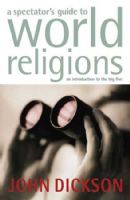
This book is one of the clearest introductions I've come across for those who want to get a handle on the major world religions. It covers Christianity, Judaism, Islam, Buddhism, and Hinduism. Dickson systematiicaly examines the history, beliefs and practices of each religions and compares and contrasts them with one another. His one page summaries are quite helpful too. The writer is one of Australia's best selling Christian authors.
Spirituality of the cross, Gene Veith
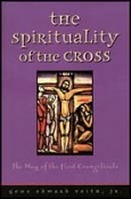
This book is an easy to read introduction to Lutheran theology and practice from a more personal angle.
After a journey of years through a variety of religious experiences and frustrations with mysticism and eastern religion, liberal theology and social justice programs, and several branches of Christianity, Dr. Gene Veith found answers in Christianity and specifically with the "first evangelicals [Lutherans]." For Veith, Christianity is not about a general vague force called God but about "God in the flesh and God on the cross" and why this matters in everyday life. Topics include: the Word of God, justification by faith, means of grace, worship , theology of the cross, vocation and the two kingdoms and the church.
After a journey of years through a variety of religious experiences and frustrations with mysticism and eastern religion, liberal theology and social justice programs, and several branches of Christianity, Dr. Gene Veith found answers in Christianity and specifically with the "first evangelicals [Lutherans]." For Veith, Christianity is not about a general vague force called God but about "God in the flesh and God on the cross" and why this matters in everyday life. Topics include: the Word of God, justification by faith, means of grace, worship , theology of the cross, vocation and the two kingdoms and the church.
Grace upon Grace, John Kleinig
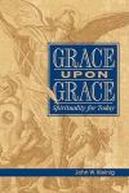
This is one of the best books I know on spirituality. Kleinig explores topics such as prayer, meditation, spiritual warfare, worship and many other areas in his discussion of 'a spirituality for today'. The following is from the introduction: "Christian spirituality is, quite simply, following Jesus. It is the ordinary life of faith in which we receive Baptism, attend the Divine Service, participate in the Holy Supper, read the Scriptures, pray for ourselves and others, resist temptation, and work with Jesus in our given location here on earth."
To live with Christ, Bo Giertz

To Live With Christ translates a collection of Giertz's classic devotions for those who want to explore their Christian faith and to connect God's Word in their daily lives. The devotional readings embrace the church-year calendar, just as Giertz did, preparing you for Sunday worship service.
Each Christ-centered devotion includes a Bible reading, meditation, and a prayer. The collection points readers to the cross of Christ, offering the assurance of God's grace, love, and forgiveness, helping them draw closer to their Lord.
Each Christ-centered devotion includes a Bible reading, meditation, and a prayer. The collection points readers to the cross of Christ, offering the assurance of God's grace, love, and forgiveness, helping them draw closer to their Lord.
Bioethics: A primer for Christians, Gilbert Meilaender
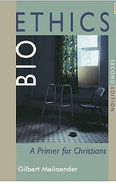
These days there are so many social issues which are controversial and which people need to think through. Christians especially have a duty to be informed here as the Church has always held that life is a sacred gift of God. THis is the best book I know of to get an introduction to the broad range of issues. Topics touched on are assisted reproduction; abortion; genetic technology; prenatal screening; suicide and euthanasia; the refusal of treatment; decision-making processes; organ donation; human experimentation; embryo research and sickness and health.
Good news for anxious Christians: Peter Carey
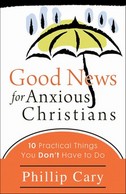
A great book that has been recently published. The chapter headings speak for themselves...
Introduction: Why Trying to Be Christian Makes Us Anxious
1. Why You Don't Have to Hear God's Voice in Your Heart Or, How God Really Speaks Today
2. Why You Don't Have to Believe Your Intuitions Are the Holy Spirit Or, How the Spirit Shapes Our Hearts
3. Why You Don't Have to "Let God Take Control" Or, How Obedience Is for Responsible Adults
4. Why You Don't Have to "Find God's Will for Your Life" Or, How Faith Seeks Wisdom
5. Why You Don't Have to Be Sure You Have the Right Motivations Or, How Love Seeks the Good
6. Why You Don't Have to Worry about Splitting Head from Heart Or, How Thinking Welcomes Feeling
7. Why You Don't Have to Keep Getting Transformed All the Time Or, How Virtues Make a Lasting Change in Us
8. Why You Don't Always Have to Experience Joy Or, How God Vindicates the Afflicted
9. Why "Applying It to Your Life" Is Boring Or, How the Gospel Is Beautiful
10. Why Basing Faith on Experience Leads to a Post-Christian Future Or, How Christian Faith Needs Christian Teaching Conclusion: How the Gospel of Christ Is Good for Us
Introduction: Why Trying to Be Christian Makes Us Anxious
1. Why You Don't Have to Hear God's Voice in Your Heart Or, How God Really Speaks Today
2. Why You Don't Have to Believe Your Intuitions Are the Holy Spirit Or, How the Spirit Shapes Our Hearts
3. Why You Don't Have to "Let God Take Control" Or, How Obedience Is for Responsible Adults
4. Why You Don't Have to "Find God's Will for Your Life" Or, How Faith Seeks Wisdom
5. Why You Don't Have to Be Sure You Have the Right Motivations Or, How Love Seeks the Good
6. Why You Don't Have to Worry about Splitting Head from Heart Or, How Thinking Welcomes Feeling
7. Why You Don't Have to Keep Getting Transformed All the Time Or, How Virtues Make a Lasting Change in Us
8. Why You Don't Always Have to Experience Joy Or, How God Vindicates the Afflicted
9. Why "Applying It to Your Life" Is Boring Or, How the Gospel Is Beautiful
10. Why Basing Faith on Experience Leads to a Post-Christian Future Or, How Christian Faith Needs Christian Teaching Conclusion: How the Gospel of Christ Is Good for Us